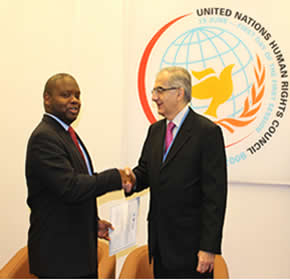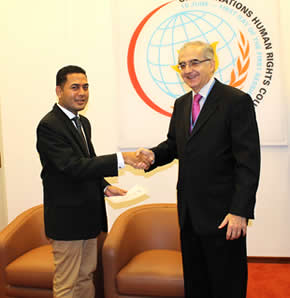2014 SIDS Fellows Bring Human Rights Back Home to Small Islands
Bringing human rights home, so the saying goes. That’s one of the main tasks of the United Nations and central to the work of the Office of the High Commissioner for Human Rights (OHCHR). But doing so takes commitments from States and civil society, steadfast advocacy, dedication, passion, enthusiasm and active participation. One can argue that with the advent of social media and enhanced internet connectivity, this task is easier. Yet, despite increased awareness and social movements, there remain obstacles in transporting the very concept of human rights into people’s homes.
 While the more common practice employed by the United Nations’ lead human rights agency has been to target audiences from within its headquarters at Geneva and various offices worldwide outwards to local communities, another approach has been to bring the local audiences here to Geneva. Virtual participation via webcast and video messages screened at meetings of the Human Rights Council at the Palais des Nations have been the norm since the body’s inception in 2006, yet now thanks to a new trust fund set up by the Council and managed by the OHCHR participants from Small Island Developing States, or SIDS, and Least Developing Countries, LDCS, can now participate in Council meetings in person.
While the more common practice employed by the United Nations’ lead human rights agency has been to target audiences from within its headquarters at Geneva and various offices worldwide outwards to local communities, another approach has been to bring the local audiences here to Geneva. Virtual participation via webcast and video messages screened at meetings of the Human Rights Council at the Palais des Nations have been the norm since the body’s inception in 2006, yet now thanks to a new trust fund set up by the Council and managed by the OHCHR participants from Small Island Developing States, or SIDS, and Least Developing Countries, LDCS, can now participate in Council meetings in person.
Since it became operational in January 2014, the Voluntary Technical Assistance Trust Fund to support the participation of government representatives from SIDS and LDCs has facilitated travel and accommodation for seven government officials from LDCs/SIDS to participate in Human Rights Council meetings in 2014. These officials represented Ethiopia, Madagascar, Maldives, Seychelles, Sierra Leone, Suriname and Vanuatu. The Trust Fund also financed two fellowships in 2014 for representatives from Barbados and Tuvalu for a period of three months. The two fellows, Ricardo Kellman and Efren Jogia, arrived in Geneva just ahead of the Council’s September session at the Palais des Nations.
Ricardo, an eight-year veteran in the Ministry of Foreign Affairs and Foreign Trade of Barbados previously based in Washington DC and currently the human rights desk officer at the Ministry, recalled how he first learned about the Fellowship in April this year and his enthusiasm which followed. “This invitation landed on my desk and when it did it was a boon. I thought this was a great opportunity to learn more about my craft, but I had no idea what to expect.” Efren recounts similar enthusiasm as well as his “marathon three-day journey” to Switzerland from his native Tuvalu, where he serves as Crown Council in the Attorney General’s Office, an office of six people. “After having arrived here from Funafuti, via Suva, Nadi, Sydney, Saudi Arabia then Brussels, needless to say I was a bit overwhelmed.”
Upon arriving in Geneva, Ricardo and Efren took part in an orientation programme organised jointly by OHCHR and the UN Institute for Training and Research in early September. Ricardo remarked how this was an “eye-opening experience” while Efren noted how taken he was by the number of participants. “I met more people in two days than I have met in one year back in Tuvalu.”
While in Geneva, Ricardo and Efren had the opportunity to participate in and represent their counties at the Council’s 27th regular session, from 9 to 26 September, and the 20th session of the Universal Periodic Review Working Group, from 27 October to 7 November. While international fora are not uncommon to either, both were wholly impressed by the setting. “It was impressive to see how the meetings were conducted, particularly the high level of decorum and respectful way in which sometimes differing views were articulated,” stated Ricardo. “In Tuvalu, the issue of human rights is very important,” Efren added. “The issue of climate change, for example, is very pertinent to human rights issues back home, and it’s good to know that there is a good platform here in Geneva to discuss these important issues.”
 Recalling the visit of the Special Rapporteur on safe drinking water and sanitation to Tuvalu in July 2012, a time when he was still in university, Efren recollects how that visit made a “lasting impression” on him. It was his introduction to the Council’s Special Procedures system - the largest body of independent experts in the UN Human Rights system that address either specific country situations or thematic issues in all parts of the world. “The Rapporteur’s visit really helped to sharpen the focus on this problem in a small island State like Tuvalu.” Both he and Ricardo agreed that their experience in Geneva provided them with a greater understanding about Special Procedures, in particular the wide range of issues they cover.
Recalling the visit of the Special Rapporteur on safe drinking water and sanitation to Tuvalu in July 2012, a time when he was still in university, Efren recollects how that visit made a “lasting impression” on him. It was his introduction to the Council’s Special Procedures system - the largest body of independent experts in the UN Human Rights system that address either specific country situations or thematic issues in all parts of the world. “The Rapporteur’s visit really helped to sharpen the focus on this problem in a small island State like Tuvalu.” Both he and Ricardo agreed that their experience in Geneva provided them with a greater understanding about Special Procedures, in particular the wide range of issues they cover.
Speaking about the Council’s Universal Periodic Review, a system through which all UN member States are subjected to a human rights review every four years, Ricardo and Efren, both of whom have been charged with following up to their countries’ reviews, noted the great potential this process has on achieving “real results”. Yet they warned that recommendations need to be realistic and implementable. “A peer to peer review would work best when States really understand what other States are struggling with and what their challenges are,” Efren remarked.
The fellows also expressed how they were impressed by the active participation of NGOs at the Geneva gatherings. “States have been wise to embrace the views of NGOs. This is the way we must stay engaged on human rights issues,” Ricardo said. “Despite the challenges in my country, Barbados, the interests of the people as voiced through civil society must continue to be a priority for the Government”.
On the merits of the Fellowship, Ricardo and Efren agreed that their experience in Geneva provided a unique insight by virtue of simply meeting with so many people from different backgrounds with common goals. They also viewed the Fellowship as an important part of a process of continuous collaboration with the OHCHR. “This is a very useful way to bring people together. There are great benefits to this type of networking,” Efren asserted.
“The Fellowship provided an extraordinary opportunity to meet key people in the United Nations’ human rights structure,” Ricardo added. “We cannot underestimate the importance of these engagements…It [the Fellowship] provided an opportunity to marry the academic approach with the practical approach to human rights. This would not have been possible back home.”
20 December 2014
